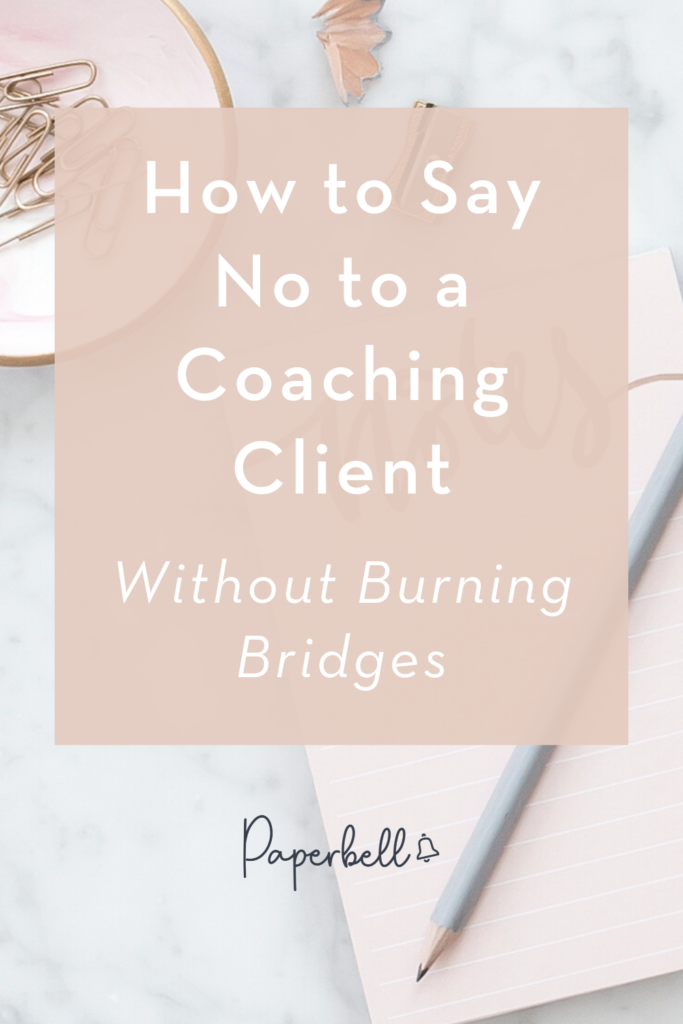Landing a coaching client is no easy feat. So why would you ever say no to one?
The truth is, not everyone is going to be the right fit for you. But there’s a right and wrong way to turn down the ones that aren’t for you.
Here’s how to say no to a client while staying professional—and four email templates you can use to do it.
Why Would You Say No to a Coaching Client?
Turning down a bad fit at the beginning is much easier than firing them after you start working with them.
As a coach, it’s easy to think that “any” client is better than “no client.” To get someone to say yes, you may be tempted to lower your prices or bend backward to please them.
While that would generate some extra revenue in the short term, you’d risk your integrity and waste resources by working with someone who isn’t for you. They would take valuable time and energy away from other clients and business initiatives. Plus, if a client is a mismatch, they will probably be dissatisfied too.
A bad business decision affects not only your coaching practice but also your personal life. Working with someone you aren’t aligned with can cause burnout, affecting every area of your life.
Lastly, saying “yes” to everyone would also do your other clients a disservice. If a bad apple drains your energy, showing up fully for your other clients will be much more challenging.
When (and How) to Say No to a Potential Client
Here are some red flags that tell if a client is a bad idea.
1. Their Needs Don’t Match Your Specialty
Let’s say you’re a personal development coach with a coaching program around healthy life habits. What should you do if someone reaches out to you for help to overcome their anxiety?
If you’re not trained in this area, you won’t be able to guarantee the results they are looking for. Sure, you can always pick up new skills and knowledge to complement your specialty, but you can’t be good at everything.
So if you’re unsure you can fulfill your client’s needs, it’s better to be upfront about it. Always listen attentively to what they’re trying to achieve to ensure that working together is a win-win for both of you.
2. The Client Crosses Your Boundaries
Boundaries are essential in any relationship and it’s no different for a coaching engagement. Maintaining professional standards means reinforcing your own rules and keeping your client relationships ethical.
Crossing boundaries in a coaching relationship can manifest in several ways like:
- Showing up late to (or completely ghosting) your sessions regularly or without a valid reason.
- Requesting to contact you urgently or outside of your usual methods (for example, insisting on communicating on Messenger when you’ve made it clear you only use your email address).
- Requesting additional support that falls outside of the discussed scope of your services.
- Attempting to establish a relationship with you outside of the coaching context.
- Asking intrusive and personal questions about your life unrelated to the coaching process.
- Making inappropriate comments (such as flirting or getting personal).
If you notice a prospective client crossing your boundaries, be firm and remind them what’s okay and not okay with you. If they break that agreement, it’s better to part ways with them.
3. The Client Doesn’t Value Your Services
There’s a time and place to offer lower prices for your coaching services. If you’re still new to the business and want to gather some testimonials, there’s no shame in starting at a lower rate.
But once you’ve proven you can get results for your coaching clients, you can command higher prices. Your standard rate will vary depending on the income you want to generate and the results you can provide.
Someone isn’t necessarily a bad client if they give you pushback on your rates (so long as they do it respectfully.) However, accepting lower-paying clients will stop you from having the energy and space to attract higher-paying ones.
You’re the one who decides what rates are worth it to you. For example, taking on a lower-paying client might make sense if you believe you’ll get an amazing case study from the experience.
But if a client doesn’t seem to value what you do as a coach, this may cause trouble in the future. They may not follow your process and put in what they need to co-create change.
Here are some signs a client might not value your coaching expertise:
- They belittle your services or try to frame what they need as “small” (I only need a bit of help; this won’t be that hard for you, etc.)
- They haggle on a price you already agreed on.
- They make comments about other coaches offering lower prices.
Your dream clients who value what you do are out there. Give yourself the space to welcome them and skip those who don’t appreciate what you offer.
4. You’re Fully Booked
Being fully booked isn’t a red flag—quite the opposite! But it’s a valid reason to turn down a new client.
If the prospect is a good fit, you can start a waitlist and reach out to them once you have an opening. Having a backup of potential clients is one of the best strategies to keep your practice stable and potentially raise your prices in the future.
Plus, having limited or no spots for your coaching packages can bring an element of scarcity into your marketing. It communicates a high demand for what you do and signals to clients that they shouldn’t wait too long to commit to working with you.
Though it might be tempting to work extra hours and earn more when your schedule is already full, it won’t be a sustainable move. Resist the temptation to overbook yourself. Your quality of life—and the quality of your coaching sessions—will start to suffer if you overextend yourself.
5. They Try to Make You Adapt to Their Process
As a coach, you’re the expert in your own coaching process. Don’t ever let anyone tell you otherwise.
It’s not a good sign when someone tries to skip steps in your process or get you to adapt to theirs. Maybe they refuse to pay you upfront or book you within your business hours.
This happens more frequently with corporate clients, especially for consultants. You can aim at finding a middle ground, but remember, you’re a business owner, not an employee. Your business should be set up optimally to help you support each client to the best of your ability.
If a prospect won’t play by your rules, it’s a sign there’s more trouble to come later. Say no and move on.
5. They Aren’t Coachable
Some coaching clients simply aren’t a good fit for anyone because they aren’t ready to receive coaching. Initially, you might think you can convince them otherwise, but if they don’t want to change, you won’t have any luck with them.
Some red flags that show that your potential client isn’t coachable are:
- Dismissing your professional guidance and insisting on their own agenda, even if it’s counterproductive.
- Lacking self-responsibility and expecting you to solve their problems without taking required action steps.
- Being resistant to change and refusing to implement changes discussed in coaching sessions, despite agreeing to do so initially.
- Acting defensive when receiving constructive criticism necessary for their growth.
6. Your Gut Tells You No
Imagine you’ve just hopped off a free discovery session with a potential client and the vibe just felt… off.
It’s hard to pinpoint why you and a potential client don’t have chemistry. But just imagine going through the same thing every time you give this client a coaching session.
If you cringe at the thought of doing that, you shouldn’t say yes to the client. Chemistry is so important in a coaching relationship! If you’re not on the same page, you’ll struggle to get along with this person and help them attain their goals.
4 Free Email Templates to Turn Down a Client
It’s important to be both direct and professional when you say no to a coaching client.
If you believe someone else could help them better, suggest alternatives for them to pursue. This gives them a solution instead of leaving them empty-handed.
Here are four email templates that will do the job.
General Email Template to Turn Down a Client
Use this template to politely decline a client who doesn’t value your services, has broken your boundaries, or otherwise showed they would be more trouble than they’d be worth.
In this template, there’s no alternative suggestion because the assumption is that you wouldn’t recommend this client to anyone else.
Hi [First Name],
Thank you so much for taking the time to jump on a call with me earlier today. I appreciate the trust you’ve placed in me thus far.
Unfortunately, at this time, I do not feel I’m the right fit to help you with [the client’s goals].
Best of luck with all your future endeavors.
[signature]
Email Template to Offer Alternative Solutions for Your Prospect
Use this template if you have an alternative solution to suggest for your prospect. It’s an ideal email template if you didn’t feel great chemistry during the discovery session or if their needs fall outside of your expertise.
Hi [First Name],
Thank you so much for taking the time to jump on a call with me earlier today. I loved learning more about [what they need help with].
Unfortunately, at this time, I do not feel I’m the right fit to help you with [the client’s goals].
Based on our discussion, I believe [name of another coach] could be a better fit. You can contact them at [insert contact]. Feel free to let them know I’ve referred you.
I wish you all the best, and it was a pleasure to meet you!
[signature]
Email Template to Send People to a Waitlist When You’re Fully Booked
Use this template if someone reaches out to inquire about your coaching services, but you have no free spots. You have an optional line you can add if you want to refer this person to someone else.
Hi [First Name],
Thank you so much for reaching out about [your coaching packages].
I’m currently fully booked and no longer accepting new clients. However, I can let you know as soon as I have an opening if you’re interested. Let me know if this is something you’d like, and I can add you to my waitlist.
[Optional line] I also know a few other coaches who offer similar services. Let me know if you’d like me to make an introduction.
Cheers,
[signature]
Email Template for a Client Who Can’t Afford Your Rates
Use this template when a potential client’s budget is too low to align with your services, but you want to maintain a positive relationship.
Hi [First Name],
Thank you for considering my coaching services. Based on our conversation, I understand that your budget may not align with my current rates.
If circumstances change in the future, please feel free to reach out. I’d be happy to revisit the conversation then.
Wishing you success in your journey ahead!
[signature]
Build a Successful Coaching Business With Clients You Love
Growing a coaching business you love is only possible if you love your clients. That’s why it’s important to learn how to say no to someone and give yourself the space to attract the right people to work with.
Want to simplify how you communicate with your clients and manage your coaching business? Try Paperbell for free to discover how this tool can enable you to spend way less time on admin work and more time supporting your clients!

Editor’s Note: This post was originally published in January 2023 and has since been updated for accuracy.









